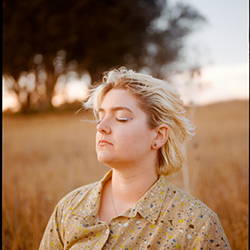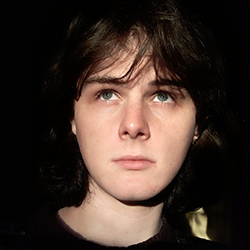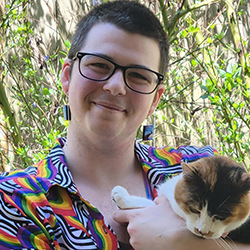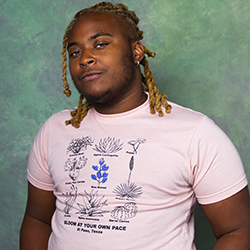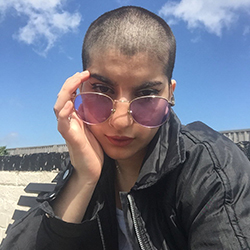2010
15 minutes. That’s how long I have to get inside. The snaking line of would-be revelers isn’t moving, and I tap my cowboy-booted toes out of impatience, which the cocaine I’ve been snorting all night doesn’t help. A shivering mass, we stand in the cigarette-and-vodka-tinged air outside the warehouse party where my partner, Switch, scored a last-minute bartending gig. We stare down the door person as though we can will them to let us in before midnight with the ferocity of our collective gaze.
Of all the places Switch could’ve been asked to bartend, the warehouse sits around the corner from the apartment I moved into yesterday. I stumbled upon it when a fellow student at a pay-what-you-can yoga class recognized me from an audition, chatted me up and offered me her room while she spends the month in Mexico. Her parents have already paid rent. It’s a step up from the friend’s studio apartment I was couch surfing at because I’m too broke for anything else. Let’s call this friend Rainbow, since he earned his name at a Rainbow Gathering. Rainbow’s futon is also his bed, which I shared while trying not to think about his unwashed, crunchy sheets, rendered as such by many Manhunt-facilitated encounters. Also, he snores. He welcomed my crashing with him indefinitely, for free, plus was the one who introduced me to Switch, and I love him…but still.
I don’t yet understand how frenetic going out for NYC New Years is—I’ve been here for this occasion in the past, but always spent the night smugly sequestered, since I’m hardly basic enough for Times Square-style celebration. I haven’t planned accordingly and here I am, in line when I should be inside to kiss Switch at midnight. At some point I give up on the idea of making it, and am still waiting on the concrete steps in a crush of strangers when the clock strikes 12 and the air explodes in cacophony. My chest burns with frustration, plus the cocaine, but ah, well, whaddyagunnado?
2010 will be a year of discovering limits. Having just moved from Maine to New York, I’m an unsupervised kid in a candy store. This means euphoria but also stomachaches.
Euphoria is coming into my own as a nonbinary person, exploring what that means. Switch is also nonbinary, and that helps. I wear eyeliner and fedoras and tunnels in my ears with large earrings through those, plus layers of necklaces and ties. I often bind and sometimes pack. As a drag king, I perform as a male, while as a go-go dancer and model I’m booked as a female or androgyne. I get she’d at one gig, he’d at another and they’d at another, and smile about how, work-wise, my gender strikes a balance.
Stomachaches are the following lessons, learned the hard way:
1. Go-go dancing in the city until 4 am, taking the train back to Brooklyn to attempt a few hours’ rest, then taking the train back to the city to stand still and naked as an art model the next morning doesn’t work. My legs feel gelatinous, the floor beneath me seems to undulate.
2. Snorting a mixture of blow and Xanax while art modeling also doesn’t work. I unwittingly induce a panic attack of sorts, and it’s one of the few times I have to feign illness and excuse myself from class.
3. Chugging green tea and rushing to my appointment for a paid ADD medication trial is a bad idea. I get kicked off due to my abnormal EKG and am out $50 a month.
4. Love is not enough to save a relationship—but I’ll still stay in this one for five more years.
5. No, I haven’t become intolerant to heat from my time in Maine—2010 is the hottest summer on record. Nauseatingly hot.
6. Panic can feel like nausea.
7. I can do gigs galore in all my genres, but there’s no one but me to say “you’re working too hard, chill out,” and I don’t know how to say that yet. The average New Yorker I meet doesn’t say to me, “Ooof, a 13-hour day? That’s bananas.” They say something like “yep, it’s all about the hustle” or “13-hour day, huh? Lucky, mine was 14.”
But back to the warehouse party, the first few minutes of 2010: the door person finally lets us in. Switch doesn’t act angry when I arrive around 12:10 and we have our belated kiss over the bar, but in hindsight I’ll think they’re disappointed, my tardiness a failing they’ll stack up with many others. A few minutes later, they accidentally drop a massive, full bottle of Grey Goose, which shatters on the floor. After the shock wears off, they laugh, as does everyone else. I think it’s cute when they screw up, not a failing—it adds dimension and makes for good stories.
Then Rainbow shows up to this party, of all the millions of parties happening tonight. Switch and I confer and confirm—neither of us told him about it. Rainbow’s rolling on E and greets us like we’re the most delightful sight of his life. In a cigarette rasp, he yells “My favorite theys!” across the space and bounds over for a bear hug. It’s yet another fated stroke, yet another sign I’m right where I need to be.
notes from the past 24 hours in my androgynous apartment
Here is the place where androgynes hide
cloistered, clad in cloaks, hoodies, blankets,
buried in research, knee-deep in words
of other places and times.
Through lock chain and deadbolt,
good luck getting in.
Electric wind waves outside contact—
cozy, flimsy placebo.
Through audiobook, Patti Smith reads Just Kids,
recalls a new haircut she gave herself.
When somebody asks, “are you androgynous?”
she thinks the word means ugly and beautiful at the same time.
Through iPhone recording, a psychic recounts
a past life as priest…no, priestess…
wait, priest? Gender that changes with the light.
This priestexx stands in an ancient field,
reading from forest texts, blessing the people—
all ye be fruitful and multiply!
The people were fruitful, multiplied,
but some have grown hateful
and while they are few,
they are the loudest poison.
Gender reveal party pyrotechnics,
in all their binaric insistence,
scorch the earth, leaving hundreds
homeless. Lifeless.
And thus, the temptation to hide,
on the part of the androgynes.
A beautiful ugly practice.
It can’t last forever…right?
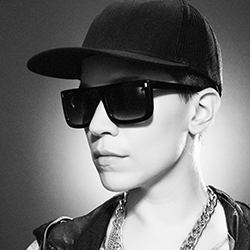
Goldie Peacock writes stories, essays, and poems. Their work appears in HuffPost, Sundog Lit, (mac)ro(mic), Roi Fainéant Press, MoonPark Review, Bullshit Lit, and more, with more to come. A panelist for the Newfound Prose Prize, they live in Lenapehoking (Brooklyn), as well as on Instagram and Twitter @goldiepeacock. Author photo by Uyphuong.


